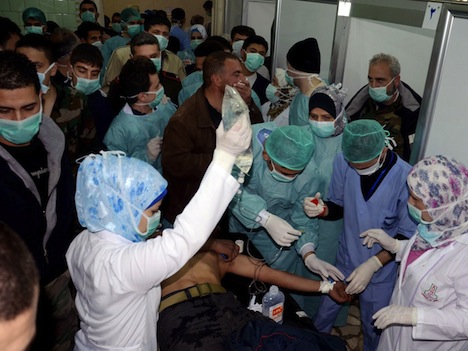In the aftermath of what now seems like a devastating and lethal chemical-weapons attack against thousands of civilians on the outskirts of Damascus early Wednesday, U.S. president Barack Obama is treading lightly on the evolving turn in the Syrian civil war — at least until we know more about the circumstances of the attack.![]()
![]()
![]()
In an interview today with CNN, Obama measured his words very carefully about what action he believes the United States or the international community can or should take in the wake of what amounts to a violation of international law:
Asked about claims by anti-regime activists in Syria that Bashar al-Assad’s government used chemical weapons in an attack that was said to have killed more than 1,300 people, Obama responded that officials are “right now gathering information” and that “what we’ve seen indicates that this is clearly a big event of grave concern.”
“It is very troublesome,” the president stressed. Obama said U.S. officials are pushing “to prompt better action” from the United Nations, and are calling on the Syrian government to allow an investigation of the site of the alleged attack outside Damascus.
“We don’t expect cooperation (from the Syrian government), given their past history,” Obama conceded. He quickly followed up with a warning, however, that “core national interests” of the U.S. are now involved in Syria’s civil war, “both in terms of us making sure that weapons of mass destruction are not proliferating, as well as needing to protect our allies, our bases in the region.”
His words are certain to disappoint both neoconservatives on the U.S. right and liberal interventionists on the U.S. left (many of which populate key roles within his administration) who see the attack as a clear violation of international law and an invitation for an aggressive response from the international community. Already, U.S. senator John McCain is renewing calls for U.S. military intervention in Syria.
But there’s good reason for caution, and although it’s politically easier to make bold statements at a time of international crisis, Obama’s statement on Friday wisely reflects the ambiguity that we still know very little about the Syrian civil war, the anti-Assad opposition, the chemical attack itself and the potential unintended consequences of a more muscular U.S. or European response.
No one is comfortable to sit idly by when a thousand civilians have been gassed to death. But in a world where human rights activists and conservative hawks alike are quick to pass judgment on the Obama administration’s reaction, it’s worth taking a moment to applaud Obama’s restraint.
We still don’t yet know who is responsible for the chemical attack nor do we actually know exactly what the attack agent was (reports indicate it was perhaps sarin, mustard gas or chlorine gas, though we won’t know until soil samples and other evidence is examined). Although British foreign minister William Hague has gone further than the Obama administration in blaming Syrian strongman Bashar al-Assad for the attack, the public evidence does not point to the clear conclusion that Hague has drawn. It’s widely accepted that Assad has access to chemical weapons, but after nearly two years of open civil war, it is not impossible for some of those weapons to have fallen into opposition hands — or worse.
The timing, most of all, is incredibly odd, as BBC security correspondent Frank Gardner and others have noted. If anything, Assad has been winning the civil war and reclaiming ground from the opposition. The opposition’s repeated attempts to form a unified front against Assad have been mixed at best. Meanwhile, a United Nations weapons inspection team was in Damascus this week to determine the extent of chemical warfare during the war. It seems incredibly unlikely that Assad, who’s gained the upper hand, would launch a chemical weapons attack the very week when UN inspectors are merely kilometers away. Allegations of previous chemical attacks stem from March and April — this is the first chemical attack in four months.
That opens the uncomfortable door to the notion that radical elements within the opposition, which ranges from secular Assad opponents to radical Sunni jihadists and al-Qaeda sympathizers, could have unleashed the attack. Knowing that it is losing, the chemical attack might have been a false-flag gambit designed to inflame international opinion against Assad, especially given the position that Obama has taken that chemical weapon use is a ‘red line’ that will merit international action. But it could be radical Islamic elements unassociated with the opposition, and it could be rogue elements of the Syrian army.
So far, Assad has refused to allow U.N. inspectors to examine the scene, which is an unacceptable response. Even Assad’s allies like Russia are calling on him to allow U.N. access, and the longer Assad hesitates, the guiltier his regime looks.
But even if Assad was responsible for the attack — the worst chemical warfare since Iraqi president Saddam Hussein unleashed chemical weapons in the 1980s against his own people and on the battlefield against Iran — there’s still reason to tread lightly. Continue reading Obama wisely treads softly in wake of Syrian chemical attack
